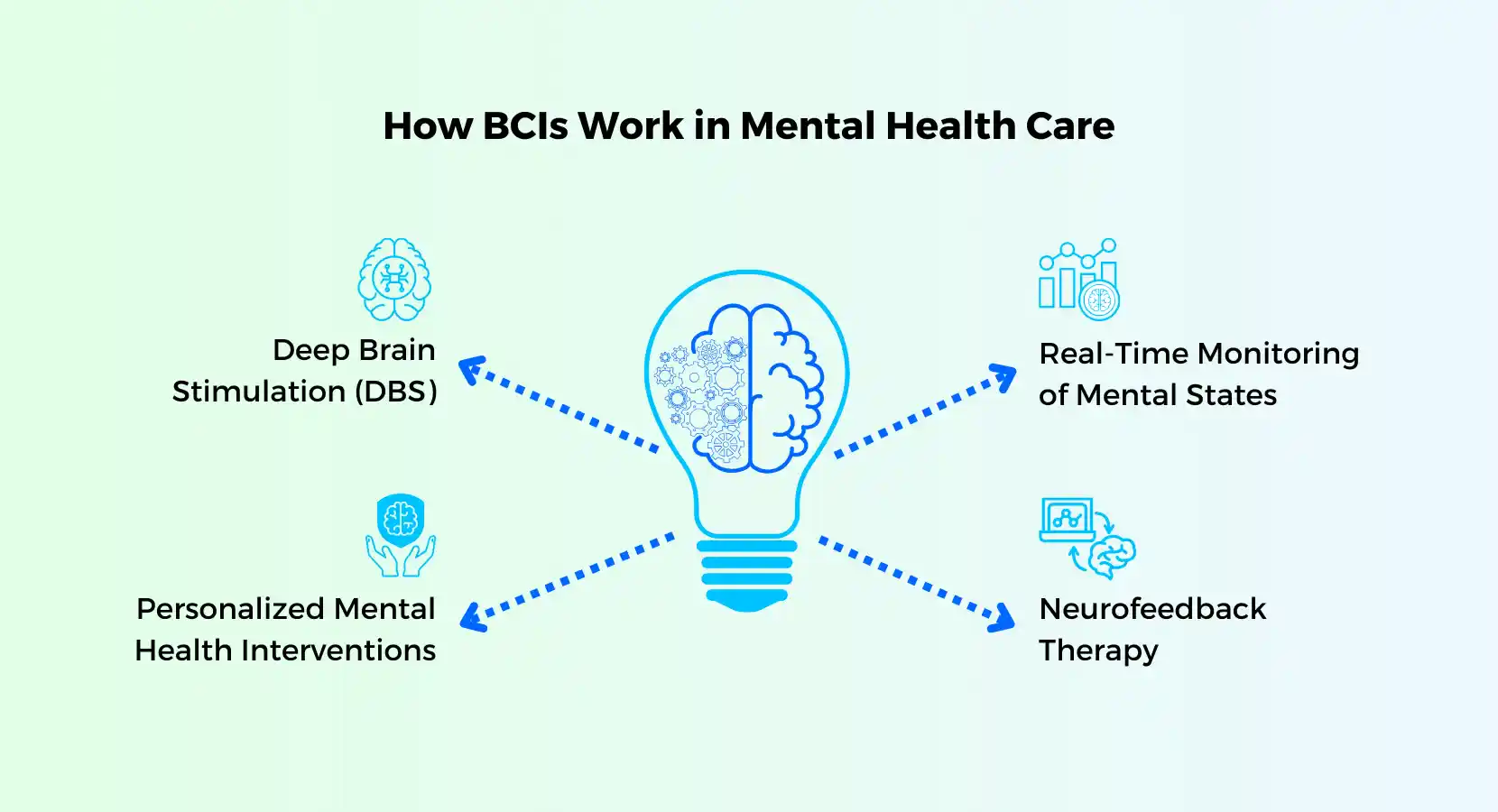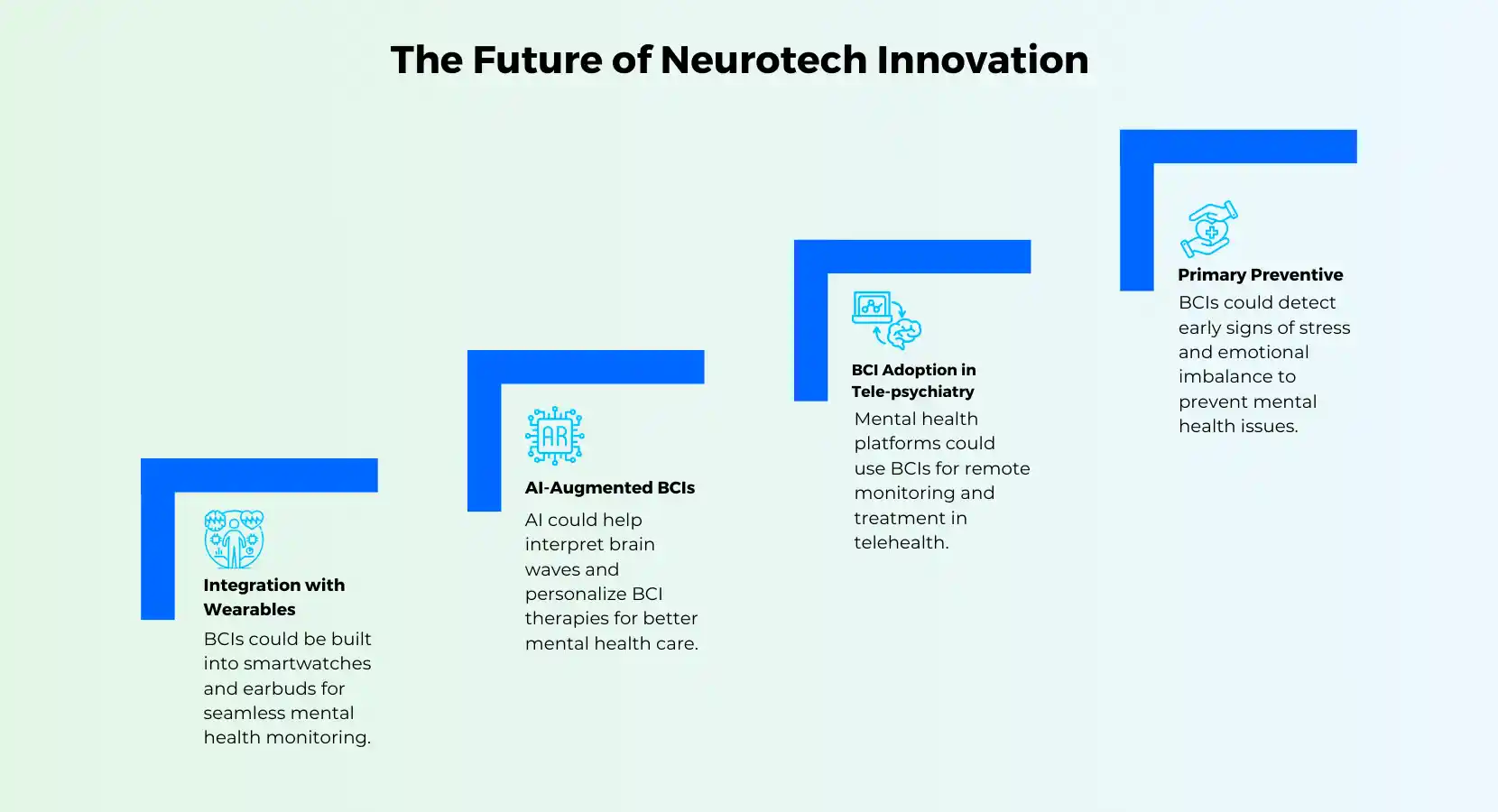Table of Contents
Have you ever imagined controlling a computer with just your thoughts? What if the same technology could help treat mental health disorders like depression and anxiety? Some of the worst health problems that have arisen during modern times involve psychiatric disorders, which include anxiety and depression among many others. While advances in psychotherapy and pharmacology have been phenomenal, many patients have not experienced relief. Here is where Neurotech comes into the picture.
A technology so new that it revolutionizes the way mental health conditions can be understood and treated. The future of psychiatry is indeed very different, now that Neurotech and Brain-Computer Interfaces (BCIs) bridge the gap between technology and the human mind.
“Brain-computer interfaces (BCIs) have the potential to revolutionize medicine, particularly in diagnosing and treating psychiatric disorders.”-Dr. Rafael Yuste, a leading neuroscientist
What Are Brain-Computer Interfaces?
Brain-computer interfaces are systems that enable direct communication between the brain and external devices. The BCIs from Neurotech use sensors to record brain activity and translate neural signals into commands that can control machines, software, or even therapeutic interventions.
This technology is either invasive or non-invasive. The former requires surgical implantation, while the latter employs wearable devices, such as EEG caps.
Originally designed to help people with physical disabilities, BCIs have really gained ground in mental health. The potential of monitoring and controlling brain activity offers exciting prospects for the treatment of psychiatric disorders and opens a new chapter in Neurotech applications.
The Growing Mental Health Crisis
Anxiety and depression impact hundreds of millions worldwide, and cases are rapidly increasing due to societal pressures, the COVID-19 pandemic, and the pressure of fast-paced lifestyles.
In fact, though there are existing treatments for these disorders, many people fail to respond to conventional therapies or medications. Complications include side effects, treatment-resistant disorders, and stigma.
This is an area where Neurotech can greatly impact. Addressing the causative activity directly at the central nervous system rather than just at the symptom-reducing effects of certain mental health disorders characterizes BCIs.

How BCIs Work in Mental Health Care
BCIs are systems that can detect electrical activity in the brain and translate this into actionable data. BCIs systems can be used to either passively monitor brain activity or actively stimulate it to produce a desired outcome. Some of the promising applications of BCIs in psychiatry include:
- Real-Time Monitoring of Mental States: BCIs detect specific patterns of brain activity associated with stress, anxiety, and depression, which can be continuously monitored by clinicians to tailor appropriate treatments.
- Neurofeedback Therapy: It is perhaps the most exciting application of Neurotech; neurofeedback therapy enables individuals to self-regulate their brain activity. Observing the electrical signals from the brain on a screen, patients can learn how to change their mental states consciously to reduce symptoms of anxiety or depression.
- Deep Brain Stimulation (DBS):In such severe cases, invasive BCIs like deep brain stimulation have already shown promise. DBS will involve implantation of electrodes within specific brain areas to modulate abnormal neural activity, possibly even providing relief from treatment-resistant depression and OCD..
- Personalized Mental Health Interventions: AI-driven BCIs can adjust the treatment to fit the individual’s unique brain activity patterns, personalizing therapies such as cognitive behavioral therapy (CBT), mindfulness exercises, or medication adjustments.
BCIs and the Treatment of Anxiety
Solutions by Neurotech can benefit anxiety disorders caused by hyperactivity in areas like the amygdala. Overactive regions may be identified using BCIs and regulated. Devices such as EEG headbands used as wearable non-invasive headbands can assist in training the patient to quiet the mind using guided neurofeedback sessions.
For instance, a patient with GAD might use a BCI at home to monitor brain activity in stressful situations and receive feedback that would encourage relaxation through breathing techniques or visualization. Gradually, the brain will develop healthier response patterns to stress.
BCIs and Depression Treatment
Depression is associated with an imbalance in the activity of the neurons in such areas as the prefrontal cortex. The standard treatments include medications, which restore the balance. However, they are often late and irregular. BCIs address the issue at the source.
Neurotech could help alleviate treatment-resistant depression through stimulation of hypoactive areas or retraining patterns of thought. The use of such non-invasive techniques as Neurotech, with TMS providing stimulation by magnetic field of neural activity, has even proved to reduce symptoms of depression.
In the future, portable BCI devices may be used to enable independent management of one’s depression by guiding a person through personalized exercises aimed at restoring balance in their brain activity.
Ethical and Accessibility Concerns
Although the potential for BCIs in psychiatry is vast, Neurotech is far from being smooth sailing. Challenges to Neurotech include:
- Privacy and Data Security: BCIs record highly sensitive data about brain activity, making the security of this information critical.
- Informed Consent: Patients should be well informed of the risks and benefits of BCIs, especially for invasive procedures.
- Affordability and Accessibility: Advanced BCIs are very expensive and mainly available in research settings. It will be very important to make these technologies affordable and accessible in order to meet the global mental health needs.
The Road Ahead
BCIs are becoming more advanced, user-friendly, and accessible as research continues. The Neurotech industry is likely to expand highly, with companies and universities worldwide investing in such innovations.
Future directions:
- Integration with Wearables: BCIs could be integrated into wearable devices, such as smartwatches and earbuds, making the monitoring of mental health seamless and non-intrusive.
- AI-Augmented BCIs: In the near term, AI might assist in interpretation of brain wave patterns and adjusting BCI therapies. Personalized, adaptive care guided by artificial intelligence will take center stage and be implemented routinely.
- BCI Adoption in Tele-psychiatry: With growth in telehealth, mental health care organizations could incorporate these technologies into virtual psych platforms to have remote monitoring with treatment.
- Primary Preventive: BCIs could begin to prevent various mental health diagnoses through early signaling of stress burnout or emotional regulation dysregulation.

Conclusion
The Neurotech revolution is here, and the result is Brain-Computer Interfaces pushing psychiatry to revolutionize that area. The promise of BCIs is in the form of providing real-time information, customized treatments, and some novel therapeutic options that could transform mental health care globally.
Challenges still abound, but the advantage far outweighs the risks. Convergence technology and medicine thrust open betterment for life, particularly that of mental health disorders. The question is no longer if BCIs will change psychiatry but how quickly we can embrace this trans formative technology to heal minds and improve lives.